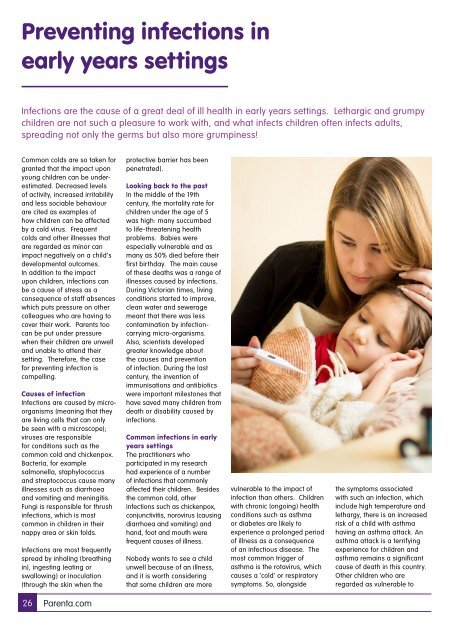Parenta Magazine June 2018
Create successful ePaper yourself
Turn your PDF publications into a flip-book with our unique Google optimized e-Paper software.
Preventing infections in<br />
early years settings<br />
Infections are the cause of a great deal of ill health in early years settings. Lethargic and grumpy<br />
children are not such a pleasure to work with, and what infects children often infects adults,<br />
spreading not only the germs but also more grumpiness!<br />
Common colds are so taken for<br />
granted that the impact upon<br />
young children can be underestimated.<br />
Decreased levels<br />
of activity, increased irritability<br />
and less sociable behaviour<br />
are cited as examples of<br />
how children can be affected<br />
by a cold virus. Frequent<br />
colds and other illnesses that<br />
are regarded as minor can<br />
impact negatively on a child’s<br />
developmental outcomes.<br />
In addition to the impact<br />
upon children, infections can<br />
be a cause of stress as a<br />
consequence of staff absences<br />
which puts pressure on other<br />
colleagues who are having to<br />
cover their work. Parents too<br />
can be put under pressure<br />
when their children are unwell<br />
and unable to attend their<br />
setting. Therefore, the case<br />
for preventing infection is<br />
compelling.<br />
Causes of infection<br />
Infections are caused by microorganisms<br />
(meaning that they<br />
are living cells that can only<br />
be seen with a microscope);<br />
viruses are responsible<br />
for conditions such as the<br />
common cold and chickenpox.<br />
Bacteria, for example<br />
salmonella, staphylococcus<br />
and streptococcus cause many<br />
illnesses such as diarrhoea<br />
and vomiting and meningitis.<br />
Fungi is responsible for thrush<br />
infections, which is most<br />
common in children in their<br />
nappy area or skin folds.<br />
Infections are most frequently<br />
spread by inhaling (breathing<br />
in), ingesting (eating or<br />
swallowing) or inoculation<br />
(through the skin when the<br />
protective barrier has been<br />
penetrated).<br />
Looking back to the past<br />
In the middle of the 19th<br />
century, the mortality rate for<br />
children under the age of 5<br />
was high: many succumbed<br />
to life-threatening health<br />
problems. Babies were<br />
especially vulnerable and as<br />
many as 50% died before their<br />
first birthday. The main cause<br />
of these deaths was a range of<br />
illnesses caused by infections.<br />
During Victorian times, living<br />
conditions started to improve,<br />
clean water and sewerage<br />
meant that there was less<br />
contamination by infectioncarrying<br />
micro-organisms.<br />
Also, scientists developed<br />
greater knowledge about<br />
the causes and prevention<br />
of infection. During the last<br />
century, the invention of<br />
immunisations and antibiotics<br />
were important milestones that<br />
have saved many children from<br />
death or disability caused by<br />
infections.<br />
Common infections in early<br />
years settings<br />
The practitioners who<br />
participated in my research<br />
had experience of a number<br />
of infections that commonly<br />
affected their children. Besides<br />
the common cold, other<br />
infections such as chickenpox,<br />
conjunctivitis, norovirus (causing<br />
diarrhoea and vomiting) and<br />
hand, foot and mouth were<br />
frequent causes of illness.<br />
Nobody wants to see a child<br />
unwell because of an illness,<br />
and it is worth considering<br />
that some children are more<br />
vulnerable to the impact of<br />
infection than others. Children<br />
with chronic (ongoing) health<br />
conditions such as asthma<br />
or diabetes are likely to<br />
experience a prolonged period<br />
of illness as a consequence<br />
of an infectious disease. The<br />
most common trigger of<br />
asthma is the rotavirus, which<br />
causes a ‘cold’ or respiratory<br />
symptoms. So, alongside<br />
the symptoms associated<br />
with such an infection, which<br />
include high temperature and<br />
lethargy, there is an increased<br />
risk of a child with asthma<br />
having an asthma attack. An<br />
asthma attack is a terrifying<br />
experience for children and<br />
asthma remains a significant<br />
cause of death in this country.<br />
Other children who are<br />
regarded as vulnerable to<br />
the impact of infection are<br />
those with complex medical<br />
needs. Infections that may<br />
have minimal impact on<br />
children without ongoing<br />
health issues may make<br />
children with complex medical<br />
needs severely unwell and,<br />
in some cases, respiratory<br />
infections can prove potentially<br />
fatal. Again, this highlights<br />
the importance of protecting<br />
children from infectious<br />
diseases as much as possible.<br />
Putting it into practice<br />
Preventing infection in<br />
early years settings can be<br />
regarded as a safeguarding<br />
responsibility, this is because<br />
promoting children’s health<br />
is part of the responsibility of<br />
all professionals who work<br />
with children. The single most<br />
significant way of preventing<br />
infection is to reduce the<br />
spread of micro-organisms<br />
caused by touching, so close<br />
attention must be paid to<br />
handwashing procedures.<br />
Such is the evidence to support<br />
this claim that the World<br />
Health Organisation have a<br />
handwashing day to highlight<br />
its importance in promoting<br />
health by reducing the spread<br />
of infection.<br />
Whilst it may appear obvious<br />
that handwashing is something<br />
we should all do, there is<br />
a risk that we can become<br />
complacent about how and<br />
when we wash our hands.<br />
This is especially important<br />
when we are responsible for<br />
modelling good handwashing<br />
habits for children to copy.<br />
Good handwashing habits take<br />
time to develop, supervision<br />
of children takes time too.<br />
Practitioners highlighted to me<br />
that staff in pre-school settings<br />
are often vigilant about<br />
supervising handwashing,<br />
but when children transition<br />
to Reception, and the ratios<br />
of children to staff increase,<br />
supervision can be trickier.<br />
As always, teaching children<br />
using playful approaches<br />
is an effective strategy to<br />
adopt and there are several<br />
videos of handwashing<br />
songs on YouTube that<br />
may be helpful to use with the<br />
children in your setting.<br />
Immunisations play a vital<br />
role in preventing infection.<br />
However, this is another<br />
area where we can become<br />
complacent. We may know<br />
the names of the infectious<br />
diseases that immunisation<br />
programmes prevent, but it is<br />
less likely that we understand<br />
or remember the ways that<br />
diseases affected children<br />
in bygone days. Infections<br />
such as polio and diphtheria<br />
frequently left children with a<br />
legacy of disability and often<br />
resulted in death.<br />
Working with parents<br />
Working with parents to<br />
develop a consistent and<br />
shared approach to preventing<br />
infection is vital, but not without<br />
its challenges. Developing<br />
and implementing a robust<br />
sickness policy can mean that<br />
children need to be away from<br />
the setting with subsequent<br />
difficulties for parents who<br />
do not have flexibility in their<br />
work patterns. Some parents<br />
have certain health beliefs,<br />
for instance, there may be<br />
limited understanding about<br />
the nature and treatment of<br />
infections. A global threat to<br />
how infections are managed<br />
is the misuse and overuse<br />
of antibiotics, therefore, an<br />
understanding of safe and<br />
effective use of antibiotics is an<br />
important consideration as part<br />
of your medication policy.<br />
The presence of an infection<br />
can provoke strong reactions<br />
from parents who may not<br />
understand the background<br />
to a child being<br />
diagnosed<br />
with an<br />
infection. One<br />
example is<br />
when a<br />
child<br />
with<br />
complex medical needs<br />
developed MRSA and, because<br />
of media reporting, parents<br />
were aware of the infection but<br />
needed reassurance that their<br />
child was not susceptible to<br />
the infection in the same way.<br />
The practitioners who were<br />
managing the situation found<br />
the HPC website invaluable in<br />
giving them evidence-based<br />
guidance that they could use to<br />
reassure the parents that their<br />
children were safe.<br />
Parents often have strong<br />
feelings about having their<br />
child immunised as laid out<br />
in the government’s childhood<br />
immunisation policy. Whilst<br />
it is important to support<br />
parents’ wishes where possible,<br />
it is also part of a setting’s<br />
responsibility to safeguard all<br />
children’s health by ensuring<br />
the vast majority of children<br />
are immunised. There are very<br />
few children for whom medical<br />
exemption from immunisations<br />
is advised. One example of<br />
exemption is for children who<br />
are receiving drugs which<br />
suppress their immunity as part<br />
of cancer treatment or for those<br />
who have received an organ<br />
transplant. In the UK, it is not<br />
mandatory to have children<br />
immunised before starting<br />
school, but in some countries,<br />
such as the United States, it is a<br />
legal requirement that parents<br />
provide evidence of their child’s<br />
‘shots’ before they start school.<br />
Conclusion<br />
Preventing infection plays a<br />
key role in keeping children<br />
safe and maximising their<br />
participation in their early<br />
education, as well as improving<br />
their wellbeing. It may not<br />
be possible to eradicate all<br />
infection, but there may be<br />
more that can be done to<br />
reduce the incidences of<br />
illness caused by infection.<br />
Careful scrutiny of the causes<br />
of children being unwell and<br />
a review of policies, including<br />
those that are aimed at<br />
keeping the environment as<br />
hygienic as possible, is time<br />
well spent, especially if it<br />
reduces the stress levels for<br />
everybody in your setting!<br />
Jackie Musgrave<br />
Jackie Musgrave joined<br />
the Open University as<br />
Programme Lead for Early<br />
Childhood in October 2017.<br />
Before that, she worked in<br />
the Centre for Children and<br />
Families at the University of<br />
Worcester from April 2012<br />
as the Course Leader for the<br />
BA (Hons) in Early Childhood<br />
(Professional Practice).<br />
Jackie trained as a General<br />
Nurse and she did postregistration<br />
training to<br />
become a Sick Children’s<br />
Nurse at Birmingham<br />
Children’s Hospital. Her<br />
professional interests as<br />
a Practice Nurse included<br />
chronic disease prevention<br />
programmes, childhood<br />
immunisations and women’s<br />
health promotion.<br />
Jackie graduated with a<br />
Master’s degree in Early<br />
Childhood Education from<br />
the University of Sheffield,<br />
gaining a distinction for<br />
her dissertation as well<br />
as being awarded the<br />
Rutland Prize for Early<br />
Childhood Education. Her<br />
doctoral research explored<br />
the effects chronic health<br />
conditions on young<br />
children and ways in which<br />
practitioners could create<br />
inclusive environments for<br />
these children.<br />
Jackie’s research-based<br />
book, Supporting Children’s<br />
Health and Wellbeing was<br />
published by Sage in May<br />
2017.<br />
26 <strong>Parenta</strong>.com <strong>June</strong> <strong>2018</strong> 27

















